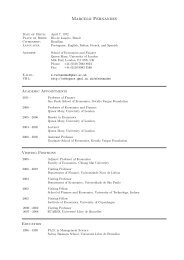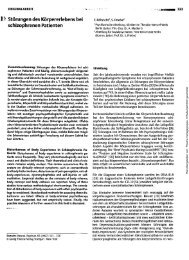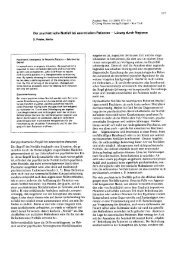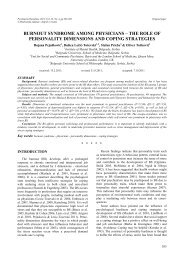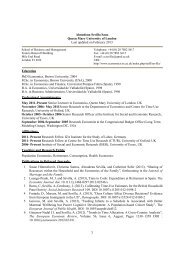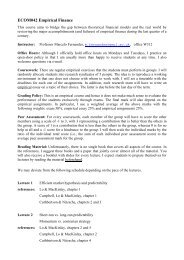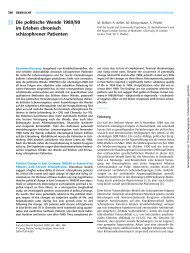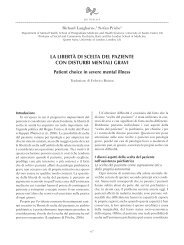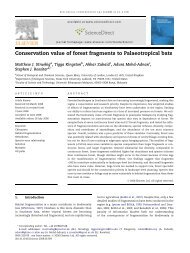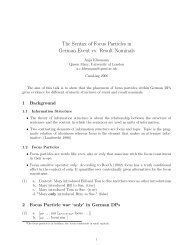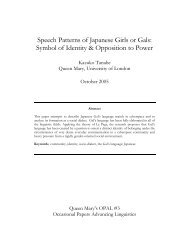Proofs - Personal Webspace for QMUL - Queen Mary, University of ...
Proofs - Personal Webspace for QMUL - Queen Mary, University of ...
Proofs - Personal Webspace for QMUL - Queen Mary, University of ...
Create successful ePaper yourself
Turn your PDF publications into a flip-book with our unique Google optimized e-Paper software.
© 2012 Elsevier Masson SAS. All rights reserved.<br />
European Psychiatry 27 (2012) / supplement n°2 / S27-S31<br />
Translation and adaptation <strong>of</strong> the Zung Self- Rating Depression Scale<br />
<strong>for</strong> application in the bilingual Azerbaijani population<br />
F. Mammadova a, * , M. Sultanov b , A. Hajiyeva a , M. Aichberger c , A. Heinz c<br />
a Baku Psycho- Neurological Dispensary, Baku Azerbaijan<br />
b Republic Psychiatric Hospital, Baku Azerbaijan<br />
c Department <strong>of</strong> Psychiatry and Psychotherapy, Charité – Berlin, Germany<br />
Keywords:<br />
Depression<br />
Scale<br />
Adaptation<br />
Cross- cultural<br />
Translation<br />
1. Introduction<br />
ABSTRACT<br />
The Zung Self- Rating Depression Scale (ZSDS) [24] is a 20-<br />
item self- reported tool, developed to measure depressive symptoms<br />
and <strong>for</strong> depression screening [25,3]. The Scale has been<br />
established as a reliable and valid measure in these areas [2,9,18].<br />
Application <strong>of</strong> the scale increases detection <strong>of</strong> depression in<br />
primary care services, [21] and it is a useful instrument in various<br />
clinical settings [11,1,7,15].<br />
From the outset, the ZSDS scale has been shown to be an<br />
effective instrument in cross- cultural settings. [24] Yet, such<br />
application <strong>of</strong> self- reported instruments presents additional<br />
challenges. The early studies, conducted in five European<br />
nations and the United States using fi ve different languages,<br />
* Corresponding Author.<br />
E-mail address: dr.fi dan.i.mammadova@gmail.com (F. Mammadova)<br />
<strong>Pro<strong>of</strong>s</strong><br />
68767<br />
EUROPEAN<br />
PSYCHIATRY<br />
THE JOURNAL OF THE EUROPEAN PSYCHIATRIC ASSOCIATION<br />
ISSN 0924-9338<br />
June 2012<br />
Vol. 27 - Supplement n°2<br />
pp. S1-S81<br />
Migration<br />
and Mental Health<br />
S1 Editorial<br />
A. Heinz, U. Kluge<br />
S4 The willingness to participate in health research<br />
studies <strong>of</strong> individuals with Turkish migration<br />
backgrounds: barriers and resources<br />
D. Dingoyan, H. Schulz, M. Mösko<br />
S10 Socio-economic status and emotional distress<br />
<strong>of</strong> female Turkish immigrants and native<br />
German women living in Berlin<br />
MC. Aichberger, Z. Br omand, A. Heredia<br />
Montesinos, S. Temur-Erman, A. Mundt,<br />
A. Heinz, MA. Rapp, M. Schouler-Ocak<br />
S17 Mental health <strong>of</strong> Turkish women in Germany:<br />
resilience and risk factors<br />
Z. Bromand, S. Temur-Erman, R. Yesil,<br />
A. Heredia Montesinos, MC. Aichberger,<br />
D. Kleiber, M. Schouler-Ocak, A. Heinz,<br />
MC. Kastrup, MA. Rapp<br />
S22 The infl uence <strong>of</strong> stigma on depression, overall<br />
psychological distress, and somatization<br />
among female Turkish migrants<br />
A. Heredia Montesinos, MA. Rapp, S. T emur-<br />
Erman, A. Heinz, U. Hegerl, M. Schouler-Ocak<br />
S27 Translation and adaptation <strong>of</strong> the Zung<br />
Self-Rating Depression Scale <strong>for</strong> application<br />
in the bilingual Azerbaijani population<br />
F. Mammadova, M. Sultanov, A. Hajiyeva,<br />
M. Aichberger, A. Heinz<br />
S32 Construction and interpretation <strong>of</strong> self-related<br />
function and dysfunction in Intercultural<br />
Psychiatry<br />
A. Heinz, F. Bermpohl, M. Frank<br />
S44 Explanatory models and concepts<br />
<strong>of</strong> West African Malian patients<br />
with psychotic symptoms<br />
F. Napo, A. Heinz, A. Auckenthaler<br />
S50 How to express mental health problems:<br />
Turkish immigrants in Berlin compared<br />
to native Germans in Berlin<br />
and Turks in Istanbul<br />
A. Vardar, U. Kluge, S. P enka<br />
S56 Health services and the treatment<br />
<strong>of</strong> immigrants: data on service use, interpreting<br />
services and immigrant staff members<br />
in services across Europe<br />
U. Kluge, M. Bogic, W. Devillé, T. Greacen,<br />
M. Dauvrin, S. Dias, A. Gaddini, NK. Jensen,<br />
E. Ioannidi-Kapolou, R. Mertaniemi,<br />
R. P uipcinós i Riera, S. Sandhu, A. Sar vary,<br />
JFF. Soares, M. Stankunas, C. Straßmayr ,<br />
M. Welbel, A. Heinz, S. Priebe<br />
S63 The concept <strong>of</strong> “intercultural opening”:<br />
development <strong>of</strong> an assessment tool<br />
<strong>for</strong> the appraisal <strong>of</strong> its current implementation<br />
in the mental health care system<br />
S. P enka, U. Kluge, A. Vardar, T. Borde,<br />
D. Ingleby<br />
S 70 Cross-cultural training in mental health care<br />
– challenges and experiences from Sweden<br />
and Germany<br />
S. Bäär nhielm, M. Mösko<br />
S75 Teaching psychiatry and establishing<br />
psychosocial services – lessons<br />
from Afghanistan<br />
I. Missmahl, U. Kluge, Z. Br omand, A. Heinz<br />
S80 Epilogue<br />
A. Kleinman<br />
Background.- A self- reported Zung Self- Rating Depression Scale (ZSDS) is recognized as a reliable and<br />
valid measure <strong>for</strong> assessment <strong>of</strong> depressive symptoms, applicable cross- culturally. The aim <strong>of</strong> the<br />
study was to adapt ZSDS <strong>for</strong> application in the bilingual Azerbaijani population.<br />
Methods.- ZSDS was translated into Azerbaijani and Russian. Two pilot studies on small samples (n=30<br />
and n=45) were conducted to improve the scale’s acceptability. A readability study was conducted<br />
on a bigger sample <strong>of</strong> depressed subjects (n=55) and healthy controls (n=120). Chronbach’s alpha <strong>for</strong><br />
the total scale, item- test correlations, alpha if item deleted, and sensitivity and specifi city at various<br />
cut- <strong>of</strong>f levels were calculated.<br />
Results.- The drop- out rate was 83.3% at the fi rst pilot study due to problems <strong>of</strong> comprehension <strong>of</strong><br />
item 5 and culturally unacceptable wording <strong>of</strong> item 6. After rewording <strong>of</strong> the items drop- out reduced<br />
to 20%. On the reliability study Chronbach’s alpha <strong>for</strong> the total scale was 0.8727, and item- test<br />
correlations <strong>for</strong> the most individual items were satisfactory. An optimal cut- <strong>of</strong>f point was 45 points<br />
with sensitivity=90.91%, specifi city=80.83%.<br />
Conclusions.- Adaptation <strong>of</strong> the Zung Self- Reported Depression Scale improved cultural acceptability<br />
<strong>of</strong> the scale in the context <strong>of</strong> the Azerbaijani study population.<br />
© 2012 Elsevier Masson SAS. All rights reserved.<br />
established a high correlation between the self- rated ZSDS<br />
and physician- administered depression rating scales across<br />
the countries. There was, however, a quantitatively signifi cant<br />
variance in the mean ZSDS across different populations [22,23].<br />
Furthermore, later research, conducted in three Asian counties<br />
and the US (four different languages spoken) also showed that<br />
means scores <strong>of</strong> ZSDS varied signifi cantly across countries [6].<br />
Thus, Zung Self- Rating Depression Scale has been proved to be<br />
a reliable self- rated depression tool, applicable cross- culturally.<br />
It must, however be adapted and validated in each cultural<br />
population context <strong>for</strong> accurate assessment <strong>of</strong> depression<br />
symptoms severity and application <strong>of</strong> the scale as a screening<br />
instrument.<br />
The aim <strong>of</strong> the study was to adapt the ZSDS <strong>for</strong> application<br />
to the bilingual Azerbaijani population, also to assess the<br />
reliability <strong>of</strong> the Azerbaijani and Russian translations in this<br />
cultural context.



